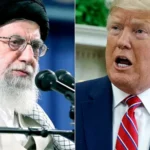
The military operation conducted by the United States against three nuclear facilities in Iran caused immediate reactions in the financial markets and lit alerts on the effects of the Middle East climbing. The action, supported by Israel, was confirmed by President Donald Trump, who stated: “Iran’s main uranium enrichment centers were completely and fully obliterated.”
In television pronouncement, Trump described the attacks as “a spectacular military success” and warned that additional offensives could be executed if Tehran is not accepted to start peace negotiations. The Iranian government’s response came through Foreign Minister Araqchi, who stated at an event held in Istanbul that the country “reserves all options to defend itself” and warned of “eternal consequences”. Araqchi also conditioned any possibility of dialogue to a proportional response from Iran.
The attack raised the perception of risk between investors and affected multiple segments of the global market. The possibility of military consequences has led analysts to foresee a shot in the price of oil and increased demand for assets considered safe, such as dollar and US treasury securities.
Mark Spindel, Director of Investment of Potomac River Capital, said that “markets will initially react with alarm, and oil will open up.” For him, the exact impact will depend on the extent of the damage caused by the offensive, but uncertainty must prevail.
Despite the scenario, stock exchanges in the Persian Gulf countries recorded relative stability or light variations on Sunday, the first business day of the week in the region. The main indexes of Saudi Arabia, Qatar and Kuwait had no significant oscillations. Already the Tel Aviv bag in Israel ended the day with historical record.
In the crypto sector, instability was more pronounced. Ether digital currency, the second largest market value, fell 8.5% only on Sunday. Since the beginning of the Israeli offensive on June 13, the cumulative drop of cryptocurrency has reached 13%.
Another point of attention in the international scenario is the possibility of increasing global inflation, motivated by a possible jump in energy prices. Saul Kavonic, an analyst at Australian company MST Marquee, warned that Iran can respond by aiming at the United States’s energy infrastructure in the Middle East, especially the Gulf and the Strait of Ormuz – a strategic channel through which about one third of world oil.
“It all depends on how Iran will react in the coming hours and days. But if the answer follows the previous threats, oil can reach the $ 100 mark,” Kavonic said.
Since June 10, the Brent contract has accumulated high of 18%, reaching US $ 79.04 per barrel – the highest amount recorded in almost five months. Even in the face of climbing, the S&P 500 index, a reference of the New York Stock Exchange, maintained relative stability after a slight initial fall.
Jamie Cox, partner at Harris Financial Group, believes the operation can lead Tehran to seek negotiations. “With this demonstration of strength and the total annihilation of nuclear facilities, Iran has lost its entire bargaining advantage and will probably try to negotiate a ceasefire,” he said.
The offensive also reinforced the movement of investors towards lower risk assets. Steve Sosnick, a strategist at IBKR, said that “it is hard to imagine that actions do not react negatively” and added that “doubt is the size of correction.” He estimates that the income from the Treasury titles must fall and the dollar gains strength in the face of instability.
Jack McIntyre, manager of Brandywine Global Investment Management, considered that interest effects will be limited, considering the market’s sensitivity to inflation. He pointed out that a possible “way to change the regime” in Iran, with economic openness, could have more comprehensive impacts on the future.
Historically, geopolitical shocks in the Middle East have immediate impact on markets, but also have signs of recovery in the following months. A survey by Wedbush Securities in partnership with Capiq Pro indicates that in the three weeks after the beginning of military clashes in the region, the S&P 500 index retreated an average of 0.3%. However, two months after these events, the average increase was 2.3%.
Even with this historical tendency of recovery, the current episode represents a significant intensification in the tensions involving the United States, Iran and Israel. The operation targeted nuclear facilities, and the scenario includes public retaliation threats and permanent impact warnings.
With market volatility, pressure on oil prices and raising inflationary risks, the next developments of the crisis are observed carefully by investors, governments and international organizations. The evolution of the conflict may determine not only the course of regional geopolitics, but also influence economic decisions on a global scale.
With information from Reuters
Source: https://www.ocafezinho.com/2025/06/22/bombardeios-dos-eua-ao-ira-sacodem-mercados-globais-e-elevam-temores-sobre-inflacao-e-petroleo/

